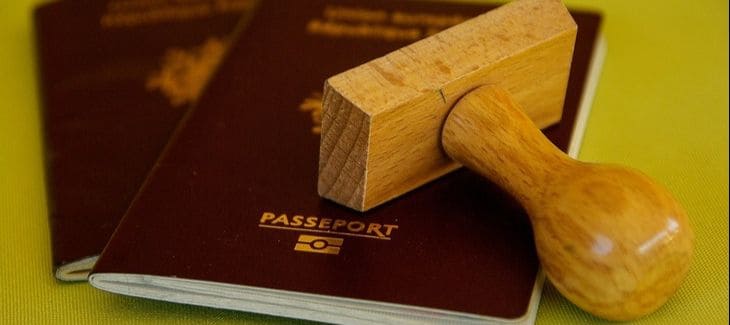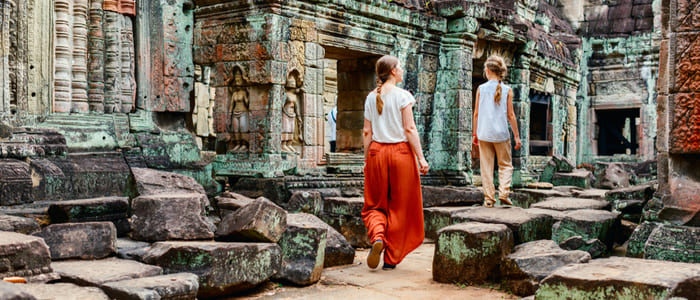
As with most nations in the world, Cambodia has a list of goods which must be declared at customs upon arrival in the country. There is also a list of prohibited and restricted items which those visiting the country should try to avoid.
When arriving at international airports in Cambodia, all travelers must complete a Customs Declaration Form even if they have nothing to declare. You must submit it to customs before leaving the airport.
Read on to learn about the process of declaring goods in Cambodia, and about the entry restrictions and tariffs for bringing larger quantities than normally permitted.
The Process of Declaring Goods at Customs in Cambodia
There are two lines for customs in Cambodia depending on the status of the traveler:
- Green Channel: Those not bringing any goods into Cambodia, or in possession of goods which can be admitted free of customs, duties, and taxes, are able to pass through this channel. You simply state that you have nothing to declare on your form.
- Red Channel: Those who enter the country with dutiable goods, or any prohibited or restricted goods, are required to disclose this on their form. They then pass through this channel.
If the value of goods is in excess of US $300, it must be declared on the Customs Declaration Form. Goods with a value of less than US $300 may be declared on the Non-commercial Customs Declaration Form.
It is important to join the correct customs line when arriving in Cambodia. This is because customs officials conduct random checks on passengers in both queues. Travelers who are found to have intentionally used the Green Channel without declaring dutiable, restricted and/or prohibited goods are liable to receive a fine or another penalty.
What Can you Bring into Cambodia?
All individual travelers to Cambodia over the age of 18 are permitted to bring the following goods free of customs, duties, and taxes:
- Up to 2 liters of wine
- 400 cigarettes, 100 cigars, or 400 grams of tobacco
- 350 milliliters of perfume and ornaments
- Medicine for personal use
- Other items not categorized as prohibited goods that the passenger requires for traveling, in limited quantities
If you who intend to import larger quantities of these goods to Cambodia, you are required to submit an import Customs Declaration Form with multiple copies of the following:
- Invoice
- Packing List
- Airway bill
- Customs Permit, issued in advance by the General Department of Customs and Excise for those importing for commercial purposes and not registered for VAT
- Other relevant documents (if required)
There is no limit on the amount of foreign currency that a traveler can bring through customs in Cambodia, although it is necessary to disclose any sums over the equivalent of US $10,000 on the Customs Declaration Form.
It is completely prohibited to import any illegal drugs to Cambodia, as drug trafficking is considered a serious crime in the country. Those convicted of drug trafficking in Cambodia can face life imprisonment as a punishment.
What Are the Tariffs for Goods at Cambodian Customs?
If you wish to import goods to Cambodia with a value equivalent to or greater than US $100 you need to pay customs tariffs consisting of import duties and value-added tax (VAT). A special tax also applies to certain goods.
Certain items are exempt from import tariffs other than the VAT, including:
- Agricultural equipment
- School materials and equipment
- Sporting goods
- Pharmaceutical products (with HS code 30)
Permit to export goods from Cambodia
Travelers to Cambodia who intend to export certain items may not be required to pay tariffs. However, you will be required to obtain permits to do so. For example:
- A permit from the General Department of Customs and Excise to export items such as statues, antiques, and ancient artifacts
- A permit from the Cambodian Ministry of Agriculture, Forestry, Hunting, and Fishery to export plants and live animals
- Both an export permit from the General Department of Customs and Excise, and a valid license from the Ministry of Interior or the Ministry of National Defense to export weapons, explosives, ammunition, and other military equipment.
Even if you have a permit for restricted goods, you still need to disclose them on the Customs Declaration Form when departing. Passengers who fail to declare any required goods, or make a false declaration, are liable to face prosecution and penalties under the laws of the Kingdom of Cambodia.
Before deciding what you will be able to take through customs in Cambodia, you should first check if you require a visa for the country. Citizens of over 200 eligible nationalities are able to obtain Cambodia eVisa, which permits a stay of up to 30 consecutive days. Eligible travelers are able to apply through a simple online application form to receive an approved eVisa for Cambodia via email, eliminating the need to visit an embassy or consulate or wait in border immigration queues to obtain a Cambodia visa on arrival.


